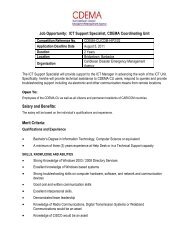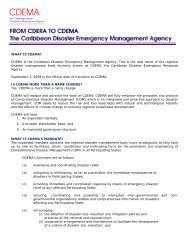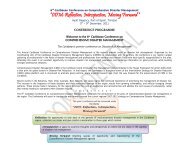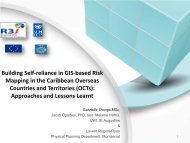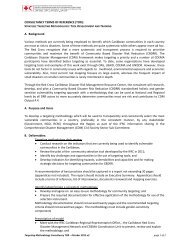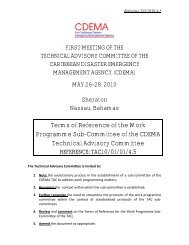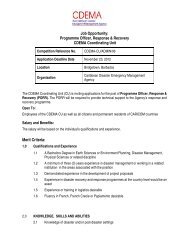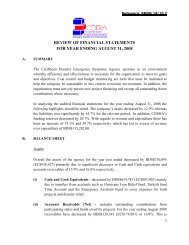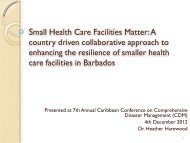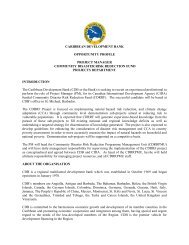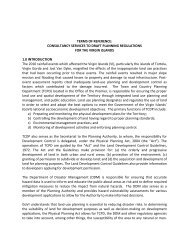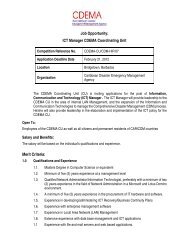Create successful ePaper yourself
Turn your PDF publications into a flip-book with our unique Google optimized e-Paper software.
Preparedness Center (APDC) developed a Participant’s Workbook 10 on ‘Community-based<br />
Disaster Risk Management for Local Authorities’ which has an extensive module on ‘Monitoring<br />
and Evaluation’ (M&E). M&E can be a costly exercise, and has likely been given little attention<br />
after the intended immediate project outcomes have been achieved for this reason. However,<br />
unless community disaster risk reduction efforts are sustainable, damage and loss will continue.<br />
3.2 Good practice in DRR Climate Change Training and Capacity Building<br />
Based on the review of selected community-based disaster management and climate change<br />
materials (tool kits, training manuals and videos) listed in Appendix 2, as well as CANARI’s own<br />
experience in delivering training and capacity-building workshops, the following elements of<br />
good practice in training and pedagogy have been identified as methods and practices that will<br />
be used to inform the development of the <strong>CDEMA</strong> climate change module.<br />
a) Use of a range of teaching/training methodologies<br />
Each person learns in a different way, and using a range of training methods in a workshop<br />
setting accommodates this. Additionally, the use of a various methodologies breaks up the<br />
monotony of a training course and engages participants in different ways (see, for example,<br />
Concern Universal 11 ; and Coburn et al./UN Disaster Management Training Programme). Each<br />
methodology used has its particular strength and utility in a workshop setting.<br />
Icebreakers and energisers encourage rapid relationship building and stimulate<br />
participants at points in the workshop where their energy has dropped.<br />
Lectures, presentations and background reading are useful for conveying knowledge.<br />
Whole group discussions allow for the development of a common understanding of<br />
certain topics and identify areas where there may be conflict within the group or<br />
community.Small group discussions stimulate greater participation from people who are<br />
not confident contributing to large group discussions;<br />
Questioning techniques promote participant engagement and help to identify participants<br />
relevant prior knowledge and experience.<br />
Brainstorming allows participants to generate several ideas about an issue in a short<br />
space of time without others criticising them.<br />
Small group work and practical exercises involve participants as actors and allow them<br />
to apply information and knowledge gained to their own situation for problem solving.<br />
b) Use of Participatory Learning Action (PLA) Tools<br />
Participatory learning and action (PLA) tools are particularly useful for community level<br />
engagement because they allow not only for information and idea generation but also create<br />
space within a training setting for analysis and learning by local people. PLA tools build<br />
participation and support communication and conflict resolution, all of which have usefulness<br />
outside the workshop setting.<br />
Several disaster preparedness manuals incorporate the use of PLA tools (see material by<br />
International Federation of Red Cross and Red Crescent Societies; WWF; Daze et al./CARE<br />
International; Abarquez, et al./Asian Disaster Preparedness Center; Bread for All;<br />
for example).<br />
10 Asian Disaster Preparedness Center, 2006. Participant’s Workbook: Community-based Disaster Risk Management<br />
for Local Authorities.<br />
11 All materials referenced here are listed in more detail in Appendix 2<br />
52



